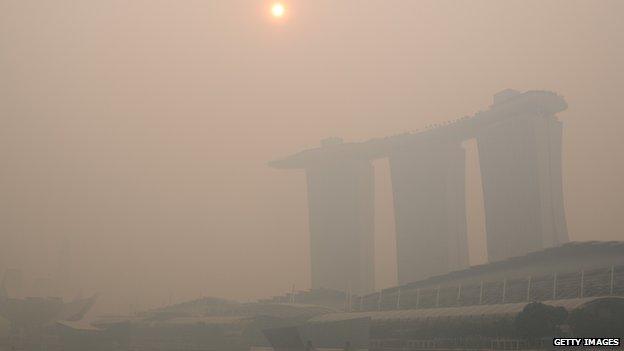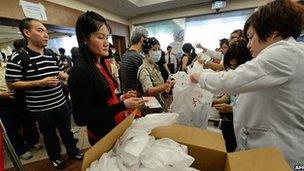Businesses hit as Singapore haze moves in
- Published

Record-high levels of pollution in Singapore have prompted people to stay indoors
Friday night is usually a happy time for most of us - it's the end of the working week.
It is a happy time for Arwhin Harie too. As sales and marketing manager of the Ying Yang roof top bar in Singapore, it is his busiest and the most profitable day of the week.
However, tonight the 40-year-old is a worried man.
"Almost all of our reservations for tonight have been cancelled and we are likely to see a 95% drop in business," he told the BBC.
He says that his bar, located in the heart of Singapore, usually caters to about 300 guests on a Friday evening.
"Tonight I have just one reservation of 10 people and I am pretty sure that will be cancelled as well," he added.
Tourism concerns
What makes him more worried is the fact that he has absolutely no control over the factors causing the sharp decline in business.
.jpg)
Residents are shunning outdoor activities, including dining out
Singapore is currently shrouded in smoky haze, from forest fires in neighbouring Indonesia, and the pollution levels in the city-state have hit a new record-high for three days in a row.
White murky gloom has enveloped the city, bringing a pungent smell of burning. Many people are choosing to stay at home and the streets are noticeably emptier.
On Thursday, Prime Minister Lee Hsieng Loong warned that the haze could remain for weeks.
Businesses and analysts have warned that the longer the problem persists, the higher the cost will be for the overall economy.
"Tourism-related sectors such as retails sales, hotels, food and beverage, and gaming, these will take a hit," Joey Wong of Barclays told the BBC.
Tourism is a big revenue earner for Singapore and according to some estimates industries related to the sector account for between 5% and 6% of Singapore's total economic output.
The last time the city-state was hit by such bad haze in 1997, tourist arrivals dropped by nearly 15% in a month.
According to a report by Barclays, there are indications that some tourists have already started to cut short their stay in Singapore and some have even cancelled their bookings.
Ms Wong said while it was too early to estimate the overall impact of the haze on the industry, the cost for the sector could be between $200m - $400m (£130m - £260m) if there was an 8% to 10% drop in arrivals.
However, she added that any drop would be temporary and the arrivals will pick up once the conditions improved.
Bad timing?
While a situation like the current one is never good for businesses, it is even worse if it happens during the peak annual period.
That is position that Singapore's retailers find themselves in. The haze has hit during the annual "Great Singapore Sale", one of the busiest shopping periods of the year.

Bad air quality has resulted in a surge in demand for disposable face masks
Lau Chuen Wei, executive director at the Singapore Retail Association, says that retailers are already experiencing a marked decline in traffic and sales are down by between 8% to 12%.
"If this continues, the industry - which is already faced with very high cost of operations - would certainly be badly hit and retailers, who are already struggling to hold on to their very slim margins, will see this being eroded further," said Ms Wei.
However, sales of disposable face masks have surged amid the poor air quality.
It is not just individual consumers who have been buying the masks, companies have been purchasing them by the box to give them out to their employees.
Prompted by the surge in demand for masks, one business at least has spotted an opportunity to boost their sales - a make-up shop that advertised a "complementary face mask" with a minimum spend of S$20 ($16; £10).
Another company has been emailing potential clients to offer conference call facilities so that they "can beat the haze by staying indoors" and still continue with their appointments.
'The worst impact'
Meanwhile back at the Ying Yang bar, Mr Harie is trying to find a way to get customers back.
He says that his firm, which runs various other outlets, has proposed hosting clients indoors but customers have been reluctant to take up those offers.
"We are trying to lure them with all sort of promotional rates and offers, but few people are willing to come out in this kind of a haze."
He said that if bookings did not pick up the bar could be looking at about S$20,000 to S$25,000 in lost revenue just for Friday night.
"We have managed to tackle rain and strong winds in the past, but the current level of haze has made it impossible for us to fall back on any contingency plan.
"This is the worst impact any kind of weather situation has had on our business," he said.
The one silver lining for Mr Harie on this otherwise gloomy and smog-filled day is that this is one rare Friday evening that he gets to spend with his friends.
Unfortunately, given the haze situation that will have to be indoors.
- Published20 June 2013
- Published18 June 2013
- Published22 October 2010